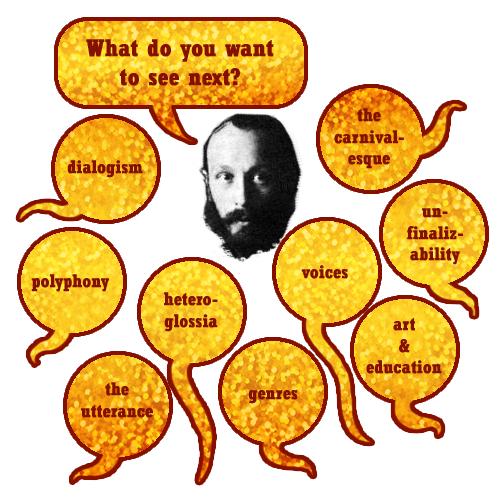

 |
 | |||
| Dialogue is the main throughline in Bakhtin's work, and it will come up throughout discussion of his ideas, especially when dealing with Polyphony and Heteroglossia, which are concepts intimately related to dialogue. Here, we'll get a broad definition of the term, and distinguish it from the superficially similar idea of the 'dialectic.' | ||||
 | ||||
|
"Bakhtin uses the term ‘dialogue’ to characterize a number of planes of human existence.
At its broadest, he sees dialogue as a characteristic of human life itself: ‘Life by its very
nature is dialogic’ (Bakhtin, 1984a, p. 293).What he means by this is that humans engage
in dialogue in multiple ways and this dialogic engagement manifests what it means to be
human: ‘The very meaning of man (both internal and external) is the deepest communion.
To be means to communicate’ (Bakhtin, 1984a, p. 287)." (Rule, 2011, p.929) |
||||
 |
 |
 | |||
|
Dialogue and Dialectics
"Take dialogue and remove the voices (the partitioning of voices), remove the intonations (emotional and individualizing ones), carve out abstract concepts and judgements from living words and responses, cram everything into one abstract consciousness—and that’s how you get dialectics." (Bakhtin, 1976/1986, p. 147) | ||||
 | ||||
|
"This fragment captures Bakhtin’s essential objections to the notion of dialectic: that
it is reductive; that it is abstract; that it suggests closure and finalizability—the image
of ‘carving out’ concepts and judgements; that it is monologic in that it ‘cram(s)
everything into one abstract consciousness’ and therefore obliterates dialogue and
polyphony."
(Rule, 2011, p.932) |
||||
 |
 |
 | |||
  So, the world of dialogue can't be synthesized like Hegel's dialectics. The world can't be reduced or resolved, difference can't be transcended. It's a fact of life. Does this mean we aren't changed by dialogue, or can't come to understanding through it? |
||||
 | ||||
|
"The person who
understands must not reject the possibility of changing or even abandoning his already
prepared viewpoints and positions." "In the act of understanding, a struggle occurs that results in mutual change and enrichment." (Bakhtin, 1976/1986, p. 142). |
||||
 |

Ayers, W., & Alexander-Tanner, R. (2010). To teach: The journey, in comics. New York, NY: Teachers College Press.
Bakhtin, M. M. (1981). Discourse in the novel (C. Emerson & M. Holquist, Trans.). In M. Holquist (Ed.), The dialogic imagination: Four essays by Mikhail Bakhtin (pp. 259-422). Austin, TX: University of Texas Press. (Original work published 1975).
Bakhtin, M. M. (1981). Epic and Novel (C. Emerson & M. Holquist, Trans.). In M. Holquist (Ed.), The dialogic imagination: Four essays by Mikhail Bakhtin (pp. 3-40). Austin, TX: University of Texas Press. (Original work published 1941).
Bakhtin, M. M. (1981). Forms of time and of the chronotope in the novel (C. Emerson & M. Holquist, Trans.). In M. Holquist (Ed.), The dialogic imagination: Four essays by Mikhail Bakhtin (pp. 84-258). Austin, TX: University of Texas Press. (Original work published 1937).
Bakhtin, M. M. (1984). From Rabelais and his world (H. lswolsky, Trans.). In P. Morris (Ed.), The Bakhtin reader (pp. 195-244). New York, NY: Oxford University Press. (Original work published 1965).
Bakhtin, M. M. (1984). Problems of dostoevsky's poetics. (C. Emerson, Trans.). Minneapolis, MN: University of Minnesota Press. (Original work published in 1963).
Bakhtin, M. M. (1986). From speech genres and other late essays (H. lswolsky, Trans.). In P. Morris (Ed.), The Bakhtin reader (pp. 81-87). New York, NY: Oxford University Press. (Original work published 1976).
Cuenca, A. (2010). Democratic means for democratic ends: The possibilities of Bakhtin's dialogic pedagogy for social studies. The Social Studies, 102(1), 42-48.
Dimitriadis, G., & Kamberelis, G. (2006). Theory for education. New York, NY: Routledge.
Miles, A. P. (2010). Dialogic encounters as art education. Studies in art education: A journal of issues and research 51(4), 375-379.
Roberts, G. (1994). A glossary of key terms. In P. Morris (Ed.), The Bakhtin reader (pp. 245-252). New York, NY: Oxford University Press.
Rule, P. (2011). Bakhtin and Freire: Dialogue, dialectic and boundary learning. Educational philosophy and theory 43(9), 924-942.